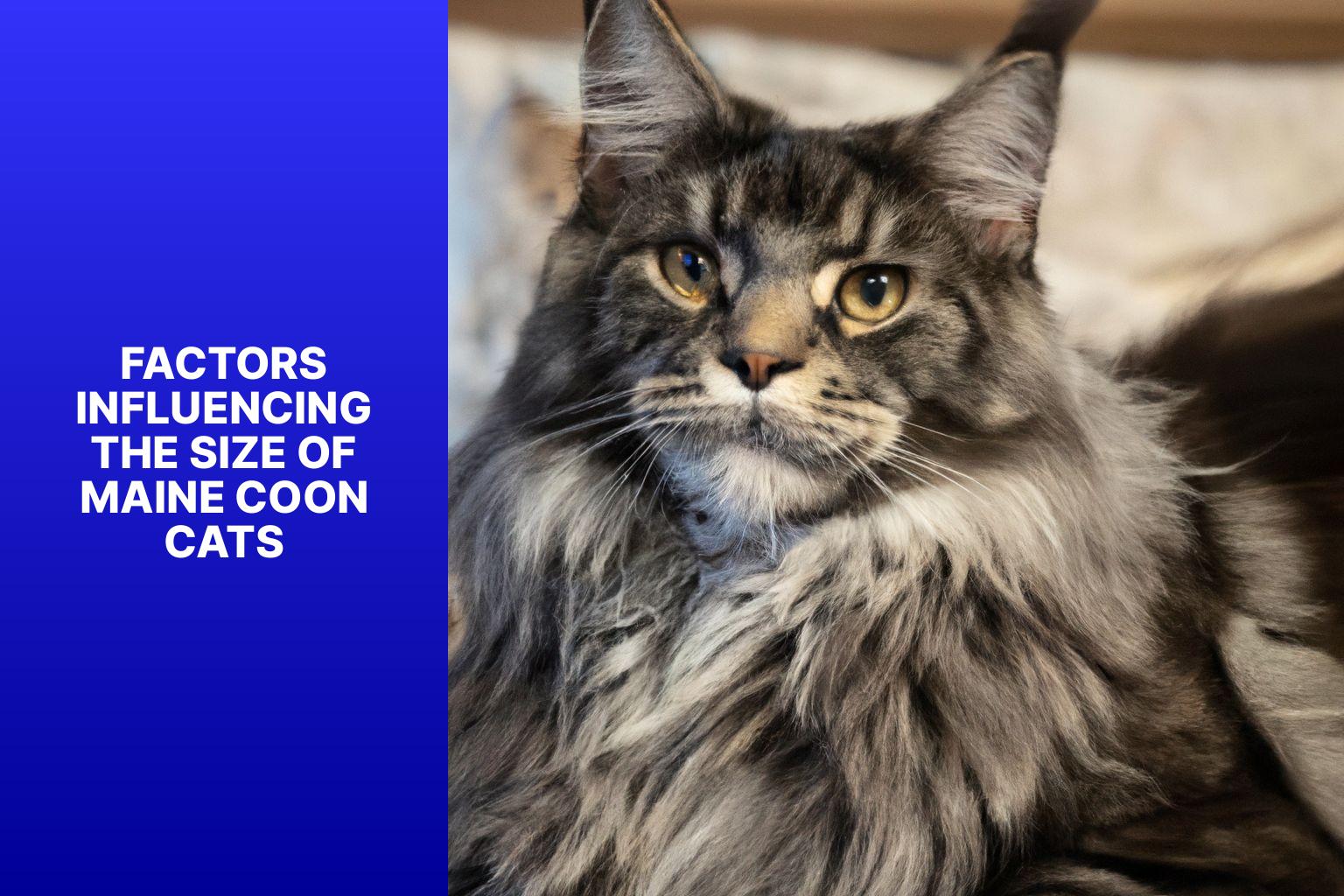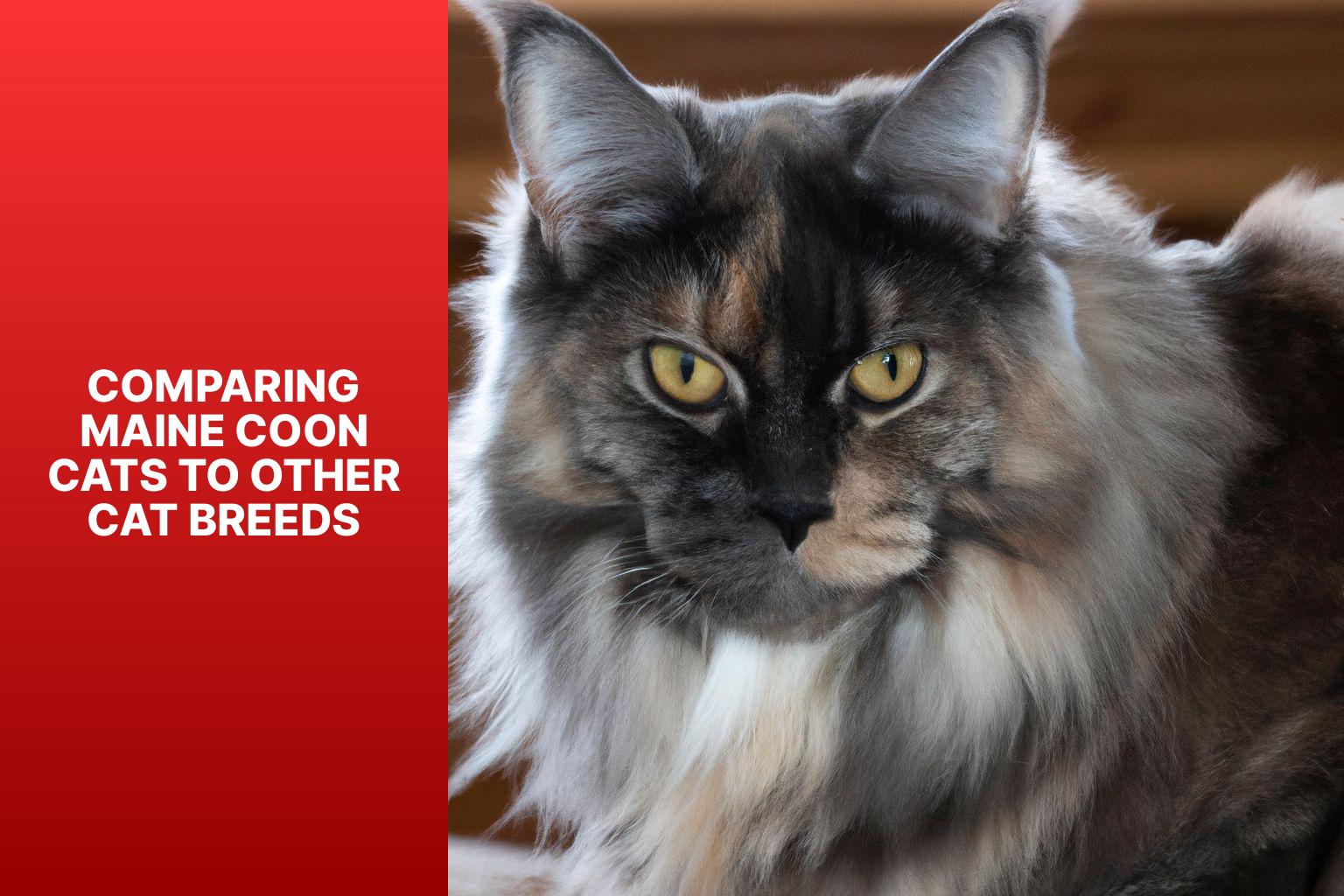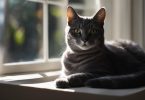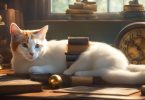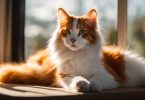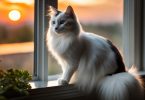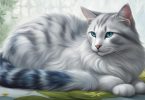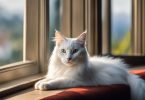Maine Coon cats are renowned for their impressive size and distinctive physical characteristics. Understanding the size and physical traits of these majestic felines can help prospective owners and cat enthusiasts appreciate their unique qualities. Here, we will explore the physical characteristics of Maine Coon cats, factors that influence their size, and how they compare to other cat breeds.
Maine Coon cats are known for their large size and robust build. They are considered one of the largest domestic cat breeds, with males weighing between 13 to 18 pounds and females weighing between 8 to 12 pounds on average. These cats have long, muscular bodies and sturdy bone structure, making them appear larger than other breeds.
Their coat and fur are another distinctive feature. Maine Coon cats have a thick, shaggy, and water-resistant double coat that protects them from the harsh weather. Their fur comes in various colors and patterns, ranging from solid colors to tabby patterns, adding to their visual appeal.
Facially, Maine Coon cats have a unique appearance. They have high cheekbones, a strong jawline, and large, expressive eyes. Their ears are wide at the base and topped with tufts of fur, giving them a regal and attentive look.
Several factors influence the size of Maine Coon cats. Genetics play a significant role, as certain bloodlines are known for producing larger individuals. Breeding practices that focus on selecting for larger size can also contribute to the overall size of these cats. Diet and nutrition play a crucial role in the growth and development of Maine Coon cats, ensuring they receive a balanced and appropriate diet to support their size potential. Regular exercise and physical activity are also important for maintaining their muscle tone and overall well-being.
Comparing Maine Coon cats to other cat breeds further highlights their remarkable size. When compared to domestic shorthair cats, Maine Coons are noticeably larger and have a more distinctive appearance. Similarly, when compared to Ragdoll and Persian cats, Maine Coons tend to be bigger in size.
Caring for large cats like Maine Coon cats requires special considerations. Providing ample living space and an enriched environment that allows for their size and physical abilities is important. Grooming their thick fur regularly helps prevent matting and ensures their coat remains healthy. Regular veterinary care is essential to monitor their health and address any potential issues that may arise due to their size.
Understanding the physical characteristics, factors influencing size, and comparisons to other breeds can assist prospective owners in appreciating and caring for these magnificent Maine Coon cats.
Key takeaways:
Key takeaway:
- Maine Coon cats are one of the largest domestic cat breeds: They can reach impressive sizes and weights, making them stand out among other cat breeds.
- Maine Coon cats have distinctive physical characteristics: They are known for their long, thick coats, tufted ears, and impressive facial features.
- Factors such as genetics, diet, and exercise can influence the size of Maine Coon cats: Proper breeding, nutrition, and adequate physical activity can contribute to the growth and development of these large cats.
Physical Characteristics of Maine Coon Cats
Maine Coon cats are not your typical feline companions. When it comes to their physical characteristics, they are in a league of their own. From their impressive size and weight to their luxurious coat and distinctive facial features, these cats are truly one-of-a-kind. In this section, we will take a closer look at the unique physical traits that make Maine Coon cats stand out. Brace yourself for astounding facts and fascinating details about their size, weight, coat, fur, and facial features. Get ready to be amazed by these magnificent creatures!
Size and Weight of Maine Coon Cats
The size and weight of Maine Coon cats can vary, with males typically being larger than females. Below is a table providing data on the average size and weight of Maine Coon cats:
| Gender | Size | Weight |
| Male | Large | 13-18 pounds (5.9-8.2 kg) |
| Female | Medium to Large | 8-12 pounds (3.6-5.4 kg) |
Please note that these are averages, and individual Maine Coon cats may fall outside of these ranges. Factors such as genetics, diet, and exercise can also influence their size and weight.
Male Maine Coon cats have a more substantial build and can reach lengths of up to 40 inches (101.6 cm) from nose to tail tip. Female Maine Coon cats are slightly smaller but still larger than many other cat breeds.
When considering the size and weight of Maine Coon cats, it is important to provide them with adequate space to move and exercise comfortably. Their size may also require special accommodations for feeding and grooming.
Maine Coon cats are known for their impressive size and weight, setting them apart from other cat breeds.
Coat and Fur of Maine Coon Cats
The Maine Coon cats are known for their distinctive coat and fur characteristics that set them apart from other cat breeds. These key features include their long and shaggy coat with a thick undercoat for insulation, which keeps them warm in cold weather. Their fur is water-resistant due to the presence of outer guard hairs, ensuring they stay dry even in damp conditions.
When it comes to colors and patterns, Maine Coon cats come in a variety of options. You can find them in solid colors, tabby patterns, and tortoiseshell patterns. It is worth noting that male Maine Coon cats often sport a luxurious mane that frames their face, giving them a regal appearance and distinguishing them from females.
Despite their long fur, Maine Coon cats surprisingly have minimal shedding. Regular grooming is essential to maintain clean and tangle-free fur. This can be achieved through brushing and other appropriate grooming practices.
To keep your Maine Coon cat’s coat and fur in top shape, it is important to regularly groom them to prevent matting and ensure their fur remains healthy and shiny. Use a wide-toothed comb or a grooming brush suitable for long-haired cats. A balanced diet and providing proper hydration play a crucial role in the overall health of their coat and fur.
Facial Features of Maine Coon Cats
The Facial Features of Maine Coon Cats are truly extraordinary.
These distinct characteristics include their large, tufted ears which not only enhance their exceptional hearing abilities but also add to their unique appearance.
Maine Coon Cats are also known for their large, expressive eyes that come in various colors, giving them an alert and intelligent look.
Their broad and prominent nose further contributes to their regal and majestic appearance.
One of the distinguishing features of Maine Coon Cats is their square-shaped muzzle, which sets them apart from other cat breeds and emphasizes their strong facial structure.
These magnificent cats possess long and impressive whiskers that aid them in navigating and sensing their surroundings.
It is fascinating to note that Maine Coon Cats are not only beautiful but also have a friendly and sociable nature, making them great companions who love being around their human families.
Factors Influencing the Size of Maine Coon Cats
Photo Credits: Www.Catcornerblog.Com by Kyle Rivera
When it comes to the size of Maine Coon cats, there are several factors that play a role. In this section, we’ll dive into three key influencers: genetics and breeding, diet and nutrition, and exercise and activity levels. 🐾 So, buckle up and let’s uncover the secrets behind what makes these majestic cats so big and beautiful!
Genetics and Breeding
The genetics and breeding of Maine Coon cats play a significant role in determining their size and characteristics. These cats have a genetic predisposition for larger size, which is directly influenced by the size of their parents.
Reputable breeders carefully select cats with large size traits for mating, as multiple genes interact to influence the size of Maine Coon cats. It is important to note that environmental factors such as diet and exercise can also impact the overall size of these cats.
Therefore, considering both genetics and breeding is crucial for those who desire larger-sized Maine Coon cats. Reputable breeders who prioritize the selection of cats with desired traits increase the likelihood of producing Maine Coon cats with the desired size.
Providing a nourishing diet and ensuring regular exercise are essential for the growth and development of these cats.
For expert advice on genetics and breeding, it is recommended to consult with experienced breeders and professionals to make well-informed decisions regarding Maine Coon cats.
Diet and Nutrition
Diet and nutrition play a critical role in maintaining the health and well-being of Maine Coon cats. These large and active cats require a well-balanced and nutritious diet to meet their energy requirements and keep a healthy weight. Here are some essential points to consider:
1. Protein-rich diet: To develop and maintain their muscles, Maine Coon cats should consume a diet that is rich in high-quality protein sources such as chicken, fish, or turkey.
2. Balanced nutrients: Make sure that your cat’s diet contains all the necessary nutrients, vitamins, minerals, and amino acids. This will contribute to their overall health, promote a glossy coat, and strengthen their immune system.
3. Adequate water intake: It is crucial for Maine Coon cats to have regular access to fresh water. Hydration is especially important as their thick double coat can make them susceptible to overheating. Consider using a water fountain to encourage them to drink more.
4. Portion control: Maine Coon cats have a tendency to overeat, which can lead to weight gain and obesity. Provide them with measured portions according to their specific dietary needs. Consult with your veterinarian to determine the appropriate portion size based on their age, activity level, and body condition.
5. Avoid human food: It is best to refrain from feeding your cat human food. Certain foods like onions, garlic, chocolate, and caffeine can be toxic or harmful to cats.
By offering a well-balanced diet and closely monitoring their nutrition, you can ensure that your Maine Coon cat remains healthy and happy. Remember to consult with your veterinarian for personalized dietary recommendations and any special dietary considerations for your cat.
Exercise and Activity Levels
Maine Coon cats are known for their high energy and playful nature. Here are some important factors to consider about their exercise and activity levels:
– Maine Coon cats require daily exercise to stimulate them mentally and physically. Exercise and activity levels are crucial to keeping them fit and healthy. This can include interactive play sessions with toys or laser pointers, as well as providing climbing structures or scratching posts for them to explore and climb.
– They are highly active cats and enjoy interactive playtime with their owners. Regular play sessions not only burn off excess energy but also provide mental stimulation. Exercise and activity levels should be a priority to ensure their well-being.
– Maine Coon cats enjoy games that simulate hunting behaviors, such as chasing and pouncing on feather toys or treat-dispensing puzzles. This helps to keep their exercise and activity levels high.
– Regular exercise can prevent obesity, which can lead to health problems in Maine Coon cats. Exercise and activity levels play a significant role in maintaining their overall health. Providing opportunities for them to run, jump, and play keeps them fit and healthy.
– It’s important to provide a safe and stimulating environment for Maine Coon cats to explore and play. Make sure they have access to different types of toys and play areas, both indoors and outdoors if possible. This enhances their exercise and activity levels.
– The exercise needs of Maine Coon cats may vary depending on their age and individual personality. Some may be more active than others, so observe and adjust their exercise routines accordingly. Understanding their exercise and activity levels is vital to meet their specific needs.
Remember to prioritize regular exercise and playtime with your Maine Coon cat to keep them happy, healthy, and content. Properly managing their exercise and activity levels contributes significantly to their well-being.
Comparing Maine Coon Cats to Other Cat Breeds
Photo Credits: Www.Catcornerblog.Com by Jeremy White
Discover how Maine Coon cats stack up against other popular cat breeds in this exciting comparison. From comparing Maine Coon cats to Domestic Shorthair cats, Ragdoll cats, and Persian cats, we’ll dive into the fascinating traits, temperaments, and characteristics that set them apart. Brace yourself for a lively exploration, complete with intriguing facts and figures, as we delve into the world of Maine Coon cats and how they measure up to their feline counterparts.
Maine Coon Cats vs. Domestic Shorthair Cats
The comparison between Maine Coon Cats and Domestic Shorthair Cats can be summarized in the following table:
| Maine Coon Cats | Domestic Shorthair Cats |
| Breed Origin | Maine, United States |
| Size | Large and muscular |
| Weight | Males: 13-18 pounds, Females: 8-12 pounds |
| Coat | Long, thick, and water-resistant |
| Facial Features | Square-shaped muzzle, prominent cheekbones, large ears |
| Temperament | Friendly, sociable, intelligent |
| Health | Generally healthy with no specific breed issues |
This table highlights the main differences between Maine Coon Cats and Domestic Shorthair Cats. Maine Coon Cats are larger and more muscular compared to Domestic Shorthair Cats. They have unique facial features, including a square-shaped muzzle, prominent cheekbones, and large ears. Maine Coon Cats also have a long, thick, and water-resistant coat. In terms of temperament, both breeds are friendly and sociable, but Maine Coon Cats are known for their intelligence.
Both breeds are generally healthy with no specific breed issues. Individual cats may still have their own health concerns regardless of breed.
By comparing Maine Coon Cats to Domestic Shorthair Cats, potential cat owners can make an informed decision about which breed suits their preferences and lifestyle.
Maine Coon Cats vs. Ragdoll Cats
Maine Coon Cats:
- Origin: United States
- Size: Large, one of the largest domestic cat breeds
- Weight: Males: 13-18 pounds, Females: 8-12 pounds
- Coat: Thick, long, and dense coat with a shaggy appearance
- Colors: Various colors and patterns
- Temperament: Friendly, social, and outgoing
- Intelligence: Highly intelligent and curious
- Activity Level: Active and playful
- Health Concerns: Hypertrophic Cardiomyopathy (HCM), Hip Dysplasia
Ragdoll Cats:
- Origin: United States
- Size: Large, slightly smaller than Maine Coon Cats
- Weight: Males: 12-20 pounds, Females: 8-15 pounds
- Coat: Semi-long, silky coat that is softer to the touch
- Colors: Various colors and patterns
- Temperament: Friendly, docile, and laid-back
- Intelligence: Intelligent and easygoing
- Activity Level: Less active, prefers a calm environment
- Health Concerns: Hypertrophic Cardiomyopathy (HCM), Polycystic Kidney Disease (PKD)
Maine Coon Cats vs. Persian Cats
| Maine Coon Cats | Persian Cats | |
| Origin | Maine Coon cats are one of the oldest breeds in North America and originated from the state of Maine in the United States. | Persian cats are one of the oldest known breeds and originated from Persia (modern-day Iran). |
| Size | Maine Coon cats are large, weighing between 12-18 pounds for females and 16-23 pounds for males. | Persian cats are smaller than Maine Coons, weighing between 7-12 pounds for females and 9-14 pounds for males. |
| Coat | Maine Coon cats have a shaggy, water-resistant double coat. | Persian cats have a long, thick, and luxurious coat. |
| Facial Features | Maine Coon cats have a rugged and wild-looking appearance with tufted ears and a square-shaped muzzle. | Persian cats have a round face with large, expressive eyes and a flat nose. |
| Temperament | Maine Coon cats are friendly and sociable, often described as gentle giants. They get along well with other pets and children. | Persian cats have a calm, gentle, and quiet disposition. They enjoy a peaceful and relaxed environment. |
| Health Concerns | Maine Coon cats are generally healthy but may be prone to genetic conditions such as hypertrophic cardiomyopathy (HCM) and hip dysplasia. | Persian cats are susceptible to health issues such as brachycephalic syndrome and polycystic kidney disease (PKD). |
Caring for Large Cats: Special Considerations
Caring for those majestic Maine Coon cats comes with its own set of unique considerations. From providing ample living space to ensuring their grooming needs are met, this section will dive into the specific requirements that come with owning these large feline friends. We’ll also explore the crucial aspect of health and veterinary care, ensuring that these gentle giants receive the attention and support they need to thrive. So, let’s discover how to give our beloved Maine Coon cats the best care possible!
Living Space and Environment
Living Space and Environment
When considering the living space and environment for Maine Coon cats, provide them with the following:
– Ample space: Maine Coon cats require a spacious living area to move around and explore.
– Lots of vertical space: These cats love to climb and perch up high. Provide them with tall cat trees or shelves.
– Multiple hiding spots: Maine Coon cats enjoy having hiding spots for alone time. Consider providing them with cat caves or cubbies.
– Safe outdoor access: Give Maine Coon cats access to a secure outdoor area if possible. Ensure the area is escape-proof and free from dangers.
– Sturdy furniture: Maine Coon cats need sturdy, scratch-resistant furniture and cat trees to accommodate their size.
Remember, each cat is unique, and their preferences may vary. Take cues from your Maine Coon cat and provide them with an environment that suits their personality and comfort.
By following these suggestions, you can create a living space and environment that promotes the well-being and happiness of your Maine Coon cat.
Grooming and Maintenance
Grooming and maintenance are crucial for the well-being of Maine Coon cats. To keep their coat in good condition and prevent matting and tangles, it is essential to regularly brush them with either a wide-toothed comb or a slicker brush. During shedding seasons, aim to brush them at least once a week or more. In case your Maine Coon gets dirty or develops skin issues, occasional baths may be required. Always use cat-specific shampoo and warm water, ensuring to keep their ears and eyes dry. Remember to thoroughly dry their coat after bathing.
Trimming your Maine Coon’s nails on a regular basis is important to prevent overgrowth and discomfort. Make use of a cat nail trimmer and be cautious not to cut into the quick. If you are unsure about how to trim their nails, seek guidance from a veterinarian or professional groomer.
It is also important to regularly clean your Maine Coon’s ears to avoid dirt and infection. Use a soft cloth or cotton ball along with cat-specific ear cleaner to gently wipe the outer ear. Avoid inserting anything into the ear canal as it may cause harm.
In order to maintain good oral hygiene, it is recommended to regularly brush your Maine Coon’s teeth using a soft-bristled toothbrush and cat-friendly toothpaste. Dental treats or toys can be given to help keep their teeth clean.
During grooming sessions, approach your Maine Coon calmly and positively, and reward them with treats or praise. If you are unsure about any aspect of grooming, it is always best to consult with a veterinarian or professional groomer for guidance and assistance.
Health and Veterinary Care
Maine Coon cats require proper health care and veterinary care for their overall well-being. It is essential to schedule regular check-ups with a veterinarian to monitor their health and detect any potential issues early on. The frequency of these visits may vary depending on factors such as age and medical history. Vaccinations are also necessary to prevent diseases and ensure good health.
Maintaining good hygiene is crucial for the well-being of Maine Coon cats. Regular grooming of their long fur helps prevent matting and the formation of hairballs. Providing regular dental care can help prevent dental diseases.
A balanced and nutritious diet is essential for Maine Coon cats, focusing on proteins, healthy fats, and essential nutrients. It is important to ensure that fresh water is always available to keep them properly hydrated.
Regular exercise plays a vital role in keeping Maine Coon cats fit and healthy. Interactive play sessions and providing toys are great ways to promote their physical and mental well-being.
Since each Maine Coon cat is unique, it is advisable to consult a veterinarian to develop a personalized healthcare plan tailored to their specific needs.
Cats have been valued as companions throughout history, contributing their hunting abilities and forming close relationships with humans. Responsible pet ownership and a commitment to their health, including proper health care and veterinary care, are of utmost importance.
Some Facts About How Big Maine Coon Cats Are:
- ✅ Maine Coons are the largest domesticated cat breed. (Source: Our Team)
- ✅ Maine Coons can reach a height of 10-16 inches. (Source: Our Team)
- ✅ The weight of Maine Coons can range from 15-25 pounds. (Source: Our Team)
- ✅ Some Maine Coons can grow up to 40 inches in length. (Source: Our Team)
- ✅ Male Maine Coons are usually bigger than females, but there can be exceptions. (Source: Our Team)
